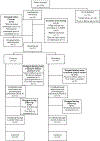Efficacy evaluation of exercise as an augmentation strategy to brief behavioral activation treatment for depression: a randomized pilot trial
- PMID: 31357916
- PMCID: PMC6989384
- DOI: 10.1080/16506073.2019.1641145
Efficacy evaluation of exercise as an augmentation strategy to brief behavioral activation treatment for depression: a randomized pilot trial
Abstract
Exercise is an efficacious intervention for mental and physical health, but few studies have identified the additive benefits of exercise prescriptions for those undergoing empirically supported psychosocial treatment. Behavioral activation (BA) involves completing activities to improve mood, an ideal format for exercise augmentation. The purpose of this study was to examine the credibility and exploratory effect size estimates of augmenting BA with exercise. Thirty-one sedentary, depressed patients were randomized to receive nine sessions of BA+exercise or BA+stretching over 12 weeks. Monthly assessments of depression, quality of life, distress intolerance (DI), perceived stress, and exercise were conducted. Results demonstrated strong credibility and completion rates of BA+exercise, comparable to other PA interventions. Randomization did not contribute to differential exercise between conditions; all participants engaged in more exercise over time. Similarly, all participants significantly improved on all outcomes over time. Condition differences emerged for DI and perceived stress; the exercise condition evidenced greater improvements over time. Participants who engaged in more exercise also evidenced greater and faster declines in depression. BA may be a useful strategy for improving depression and increasing exercise. Additional explicit exercise prescriptions may not be necessary to improve depression but may be helpful for DI and stress. Clinical Trials Registry (clinicaltrials.gov): NCT02176408, "Efficacy of Adjunctive Exercise for the Behavioral Treatment of Major Depression".
Keywords: Depression; behavioral activation; distress intolerance; exercise; physical activity.
Conflict of interest statement
Declaration of Interest Statement
In addition to Federal grant support, Dr. Otto receives royalties from multiple publishers (including royalties for books on exercise for mood). In addition, Dr. Otto received speaker support and is a member of the Scientific Advisory Board for
References
-
- Beck AT, Steer RA, & Brown GK (1996). Beck depression inventory-II San Antonio.
-
- Blair SN, Haskell WL, Ho P, Paffenbarger RS Jr., Vranizan KM, Farquhar JW, & Wood PD (1985). Assessment of habitual physical activity by a seven-day recall in a community survey and controlled experiments. Am J Epidemiol, 122(5), pp. 794–804. - PubMed
-
- Brown TA, & Barlow DH (2014). Anxiety and related disorders interview schedule for DSM-5 (ADIS-5)–Adult version: New York, NY: Oxford University Press.
-
- Chalder M, Wiles NJ, Campbell J, Hollinghurst SP, Searle A, Haase AM, … Lewis G (2012). A pragmatic randomised controlled trial to evaluate the cost-effectiveness of a physical activity intervention as a treatment for depression: the treating depression with physical activity (TREAD) trial. Health Technol Assess, 16(10), pp. 1–164, iii-iv. doi:10.3310/hta16100 - DOI - PubMed
Publication types
MeSH terms
Associated data
Grants and funding
LinkOut - more resources
Full Text Sources
Medical

